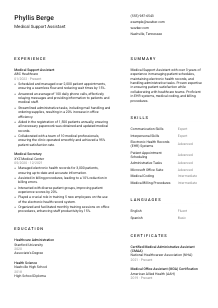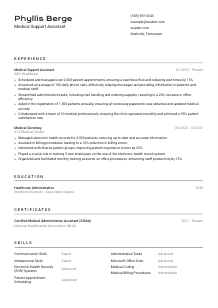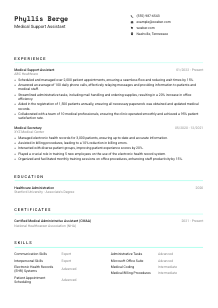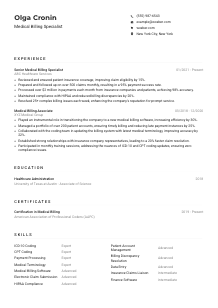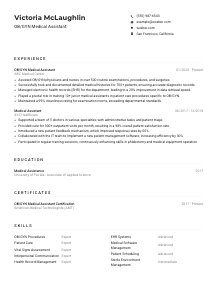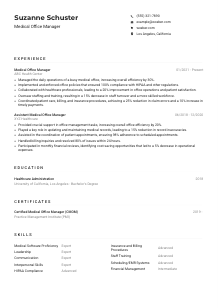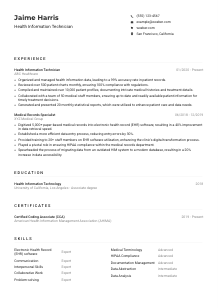Medical Support Assistant Resume Example
Navigating medical charts, but your resume feels like an illegible scribble? Unwrap this Medical Support Assistant resume example, drafted with Wozber free resume builder. Learn how to condense your healthcare expertise into clean, organized lines, leading to a career as stable as a heartbeat!
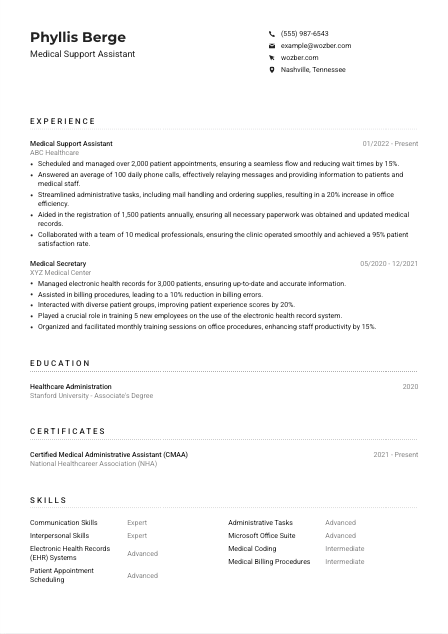
How to write a Medical Support Assistant Resume?
Embarking on the journey to become a Medical Support Assistant? You're on a path to becoming an indispensable part of a healthcare team. But first, you must navigate the competitive landscape of job hunting, starting with your resume. Fear not!
With the right approach and a sprinkle of dedication, your resume will not only land you interviews but also showcase your unique qualifications. Let's dive into tailoring your resume with precision, using Wozber's free resume builder and its dedicated tools such as the ATS-friendly resume template and ATS resume scanner for that much-needed ATS optimization.
Personal Details
Your Personal Details section is where the journey begins. It's essential to strike a chord with the employer right from the start. Let's enhance this section for the Medical Support Assistant role, ensuring every detail aligns with what the healthcare industry values.
1. Name as Your Brand
Think of your name as the headline of your professional story. Use a font that's professional yet catches the eye. This isn't just about aesthetics; it's about making your mark memorable right off the bat.
2. Job Title Alignment
Directly below your name, clearly state the position you're striving for: 'Medical Support Assistant.' This aligns your application with the job from the get-go and makes it easier for hiring managers to picture you in the role.
3. Essential Contact Information
Provide your most reachable phone number and a professional-looking email address, preferably one that includes your name. This ensures the hiring manager can contact you without a hitch.
4. Location Matters
Highlighting that you're based in or near Nashville, Tennessee, immediately shows you meet one of the specific requirements, thus eliminating any concerns about relocation.
5. Professional Web Presence
Including a link to a professional profile online, like LinkedIn, can offer deeper insights into your qualifications and character. Just ensure it's polished and mirrors the strengths outlined on your resume.
Takeaway
By refining your Personal Details section, you're not just ticking off boxes; you're laying the foundations of a compelling narrative. This is where the essence of your professional identity begins to shine, setting the stage for everything that follows. Ready? Let's impress!





Experience
Now, let's spotlight your experience in healthcare. This section is your chance to showcase why you're not just a good fit for the position but the perfect fit. With a strategic approach, we'll demonstrate your value as a Medical Support Assistant.
- Scheduled and managed over 2,000 patient appointments, ensuring a seamless flow and reducing wait times by 15%.
- Answered an average of 100 daily phone calls, effectively relaying messages and providing information to patients and medical staff.
- Streamlined administrative tasks, including mail handling and ordering supplies, resulting in a 20% increase in office efficiency.
- Aided in the registration of 1,500 patients annually, ensuring all necessary paperwork was obtained and updated medical records.
- Collaborated with a team of 10 medical professionals, ensuring the clinic operated smoothly and achieved a 95% patient satisfaction rate.
- Managed electronic health records for 3,000 patients, ensuring up‑to‑date and accurate information.
- Assisted in billing procedures, leading to a 10% reduction in billing errors.
- Interacted with diverse patient groups, improving patient experience scores by 20%.
- Played a crucial role in training 5 new employees on the use of the electronic health record system.
- Organized and facilitated monthly training sessions on office procedures, enhancing staff productivity by 15%.
1. Highlighting Relevant Experience
Begin with a razor-sharp focus on the job description. Each role you list should mirror responsibilities and achievements that are directly relevant to those outlined for a Medical Support Assistant. This direct alignment will underscore your suitability.
2. Structuring for Impact
Structure your experiences in reverse chronological order, starting with your most recent position. Clearly state your job title, employer, and the dates of your tenure. This clarity and organization are key to making an immediate impact.
3. Achievement-Focused Statements
For each position, articulate your accomplishments, focusing on how they align with the expectations for a Medical Support Assistant. Be specific about how your actions improved processes, enhanced patient satisfaction, or streamlined operations.
4. The Power of Numbers
Quantifying your achievements makes them tangible. Did you reduce wait times by 15%? Manage records for 3,000 patients? These specifics give weight to your contributions and showcase your impact clearly.
5. Relevance Is Key
Maintain a laser focus on the experiences that are most relevant to a Medical Support Assistant role. Avoid cluttering this section with unrelated roles or achievements, no matter how proud you are of them. Relevance trumps quantity every time.
Takeaway
Employers won't just see what you've done; they'll understand the value you bring as a Medical Support Assistant. This section isn't just a list; it's proof of your ability to excel in the role you're applying for. Let your experiences speak volumes and pave your way to that interview.
Education
In the realm of healthcare, your educational background lays the groundwork of your expertise. For a Medical Support Assistant position, presenting your education effectively can truly bolster your application.
1. Reflect Key Requirements
Identify and reflect the education requirements stated in the job posting. For instance, listing both your High School Diploma and your Associate's Degree in Healthcare Administration distinctly aligns with the role's prerequisites.
2. Clear Structure
Present your educational achievements cleanly and clearly. List your degree, field of study, and the institution, followed by your graduation date. This straightforward structure allows for easy scanning.
3. Tailoring Your Degree Details
Highlighting your degree in Healthcare Administration not only meets but exceeds the basic educational requirements, positioning you as a well-prepared candidate for the nuances of administrative duties in a medical setting.
4. Include Relevant Courses
In cases where your degree closely aligns with the job role, mentioning specific courses you excelled in can provide additional proof of your qualifications and readiness for the position.
5. Show Continuous Improvement
Healthcare is an ever-evolving field. Highlighting ongoing education, whether through workshops or certifications, demonstrates your commitment to keeping your skills sharp and staying abreast of industry changes.
Takeaway
Your education section does more than list your academic achievements. It tells the story of a candidate who is not only prepared on paper but deeply committed to their professional growth in the healthcare sector. Your dedication to your education underscores your readiness for the role at hand.
Certificates
In the healthcare world, certifications can significantly bolster your credibility and show your specialization in certain areas. Here's how to make your certifications stand out for the Medical Support Assistant position.
1. Match Job Requirements
Review the job posting to understand which certifications are preferred. For example, listing your CMAA and MOA certifications as in our resume example directly aligns with the employer's preferences, highlighting your preparedness for the role.
2. Quality Over Quantity
Focus on including certifications that are most relevant to the Medical Support Assistant role. This targeted approach ensures that every certification you list reinforces your suitability for the job.
3. Clarity with Dates
If your certifications have validity periods, include these dates. This shows current knowledge and assures employers of your qualifications' validity. Ongoing or recent certifications demonstrate an up-to-date skill set.
4. Commit to Continuous Learning
The medical field is dynamic; show you're keeping pace. Mention any recent or ongoing certifications to prove your dedication to professional growth. This eagerness to learn is a valuable trait in a fast-evolving healthcare environment.
Takeaway
By strategically selecting and presenting your certifications, you're not only ticking off a requirement checklist; you're showcasing your commitment to excellence in your field. Let your certifications narrate your journey of continuous learning and professional dedication.
Skills
The Skills section of your resume is where you get to shine a spotlight on the unique tools in your professional toolkit. For a Medical Support Assistant, this means highlighting a blend of technical prowess and soft skills.
1. Decoding Job Requirements
Start by analyzing the job description for both explicit and implicit skills required. For instance, proficiency in EHR systems, medical coding, and strong communication skills are directly requested in our example.
2. Prioritizing Most Relevant Skills
Once you've identified the skills from the job description that match your own, prioritize them in your resume. This focused listing shows you not only possess the necessary skills but also understand what's most important for the role.
3. Balanced Skill Representation
Strike a balance between hard and soft skills. In healthcare, the ability to navigate complex systems and software is as critical as the empathy and communication skills required to interact with patients and staff effectively.
Takeaway
Your skills section is your resume's powerhouse, succinctly showcasing why you're a perfect match for a Medical Support Assistant. Approach this section as your chance to stand out, boldly stating, 'I not only meet your needs but exceed them.' Keep sharpening those skills, they're your strongest advocates.
Languages
In a healthcare setting, the ability to communicate with a diverse patient base can set you apart. Here's how to align your language skills with the job requirements for a Medical Support Assistant.
1. Align With Job Requirements
First, identify if specific language skills are mentioned in the job posting. In our example, 'fluent and articulate English communication skills are essential.' Start with this as your primary language and level of proficiency.
2. Highlighting Additional Languages
If you know additional languages, listing them could give you an edge, especially if you're in a diverse community or city. It shows you're equipped to communicate with a broader range of patients and colleagues.
3. Honest Proficiency Levels
Be truthful about your level of proficiency in each language using clear terms like 'fluent,' 'intermediate,' or 'basic.' Overstating your ability can lead to awkward situations, so honesty is the best policy.
4. Understanding the Role's Scope
Consider the role's requirements and potential patient demographics. If the job involves significant interaction with non-English speakers, fluency in relevant languages can be a significant asset.
5. A Global Perspective
Your language skills are a testament to your ability to engage with a global and diverse audience. Even if you list only basic proficiency, it shows openness to cross-cultural communication and collaboration.
Takeaway
Your ability to communicate in multiple languages is more than a line item on your resume; it's a bridge to understanding and empathy in healthcare. By aligning your language skills with the needs of your potential employer, you're not just applying for a job; you're preparing to make a real difference in the lives of patients and colleagues.
Summary
The Summary section is your resume's handshake, your first opportunity to introduce yourself. For a Medical Support Assistant position, it's about succinctly conveying your readiness, capability, and fit for the role.
1. Capturing the Role's Essence
Begin with a comprehensive understanding of what the job entails and tailor your summary to reflect these requirements. Mention your years of experience and highlight your proven skills in areas like EHR systems and medical billing.
2. Opening Strong
Start your summary with a powerful opening line that encapsulates your professional identity. For example, 'Dedicated Medical Support Assistant with over 3 years of experience in optimizing patient care through efficient administration.'
3. Reflecting Key Abilities
Highlight a few of your core skills and achievements, particularly those that align with the job description. Showcase tangible impacts you've made in previous roles to cement your candidacy.
4. Brevity and Impact
Your Summary should be a tightly woven narrative that's both compelling and concise. Three to five impactful lines are all you need to make a strong impression.
Takeaway
A well-crafted summary doesn't just tell hiring managers about your qualifications; it shows them you're precisely what they've been looking for. It sets the tone for a resume that's tailored not just to a job, but to a fruitful career in healthcare. Make every word count, and let your professional story intrigue and inspire.
Launching Your Medical Support Assistant Journey
With every section refined and tailored, your resume is now a formidable tool in your job-hunting arsenal. Using Wozber's free resume builder, including its ATS-friendly resume templates and ATS resume scanner for optimal ATS optimization, you have everything you need to craft a resume that resonates with hiring managers. Remember, your resume is more than a document; it's a narrative of your professional journey. Polish it, personalize it, and let it pave your way to a rewarding career as a Medical Support Assistant.
The healthcare industry awaits your expertise; it's time to make waves. Go forward with confidence!

- High school diploma or equivalent certification is required.
- Minimum of 1-3 years of experience as a medical secretary or related role.
- Proficiency in electronic health record (EHR) systems, medical coding, and billing procedures.
- Strong interpersonal and communication skills to interact effectively with patients and medical staff.
- Certification in Medical Administrative Assistant (CMAA) or Medical Office Assistant (MOA) is preferred.
- Fluent and articulate English communication skills are essential.
- Must be located in or near Nashville, Tennessee.
- Schedule patient appointments and maintain patient records in the electronic health record system.
- Answer phone calls, relay messages, and provide information to patients and medical staff as requested.
- Perform general administrative tasks such as handling mail, filing records, and ordering office supplies.
- Assist with patient registration, checking patients in and out, and collecting necessary paperwork.
- Collaborate with the medical team to ensure smooth operations and patient satisfaction.





